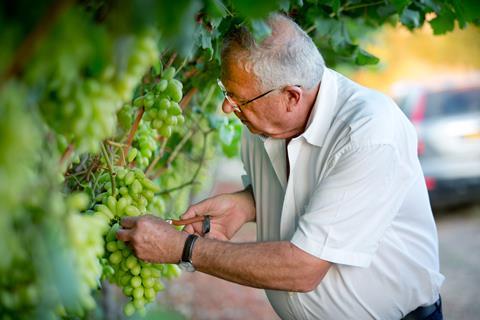Fierce competition on overseas markets and strong domestic sales have combined to reduce Israeli grape exports to zero, but the country’s role in the development of new varieties is key
A decade ago, Fruitnet reported that Israeli grape exports were in decline, falling from 7,000 tonnes in 2006 to 5,000 in 2010, and down to 3,000 tonnes in 2014. The reasons were various – adverse exchange rates, seasonal EU-imposed taxes for imports after 31 July, price competition with Egypt and India, and (fortunately for the country’s growers) ever-increasing local demand.
Turning to the present, nobody in Israel is currently planning to export grapes. In the seasons prior to Covid, only a few hundred tonnes were exported, and it would appear that the pandemic has seen off Israeli grape exports, at least temporarily.
One positive has been the strength of the domestic market, although there is an expectation that labour and mobility problems, caused by the ongoing war, will affect grapes no less than other horticultural products.
Table grape consumption, however, is on the rise, as consumers become increasingly aware of the benefits of eating nutritious foods. Technological developments in grape storage, controlling grape decay and reducing water loss, are encouraging market expansion.
The area under production in Israel remains fairly static at around 3,000ha, producing nearly 100,000 tonnes. Main areas of cultivation are the Jordan Valley, central Israel between Tel Aviv and Jerusalem, and the more southern area of Lakhish. A range of varieties are grown, including two very early Arra varieties (Honey Pop and Sugar Drop), which are cultivated in protected houses in the Jordan Valley; Superior and Big Pearl, which are early summer varieties, and Timpson and Thompson Seedless, which are produced during July.
Although Israel’s exports of table grapes have dropped to zero, innovative varieties developed and bred by Israeli breeders are cultivated in major grape-growing areas around the world, in over 30 countries on six continents. Grapa Varieties is a global family business that specialises in breeding and licensing premium table grape varieties worldwide, under the Arra and Early Sweet brands.

Shachar Karniel, the fourth generation founder of Karniel Farms, became a partner in 1999 for the establishment of the ARD breeding programme, a subsidiary of Giumarra Vineyards in Bakersfield, California. Today, Karniel continues to develop and perfect Arra table grape varieties at the grape breeding centre in California.
The Volcani Institute’s ARO Breeding Programme, led by Dr Avi Perl, formerly chief scientist at the Ministry of Agriculture, has been releasing new commercial and semi-commercial table grape varieties that have been extensively tested in Italy, South Africa, Egypt, Greece, Mexico, Chile and India. Big Pearl plays a significant role in local market cultivation while Desert Pearl, a white seedless variety that is sweet and crunchy, is one of the new varieties coming out of the programme.
Mountain Pearl, a very large dark-red seedless variety, has been commercially released in the past growing season, while the unique Grapple variety, a table grape with an apple flavour and firm texture, is on the way to full commercialisation.
Imports of fresh grapes into Israel have increased sharply in recent years, rising from round 10,000 tonnes in 2016/17 (soon after import restrictions were lifted) to almost 10 times that quantity, the primary source being South Africa.
The dominant entity on the local Israeli market, both in production and in marketing of table grapes, is Tali Grapes. This is the brand name of the agricultural produce of Moshav Lachish, home to 66 active agricultural farms that are incorporated into an agricultural cooperative (founded in 1966) in order to market the grapes of the cooperative members directly to chains in Israel and abroad. In addition to growing a range of Israeli-bred varieties, Tali Grapes has licensed the cultivation of innovative varieties from SunWorld in the US.



